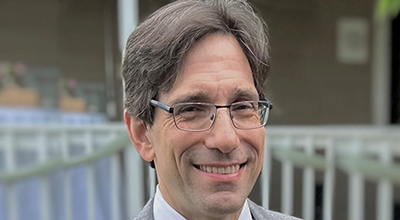I am NIMH: Q&A with Nick Gaiano

Nick Gaiano, Ph.D.
Branch Chief
Extramural Review Branch
What is your name and job title?
My name is Nick Gaiano, Ph.D. I’m the branch chief of the Extramural Review Branch in the Division of Extramural Activities at NIMH.
I’ve always considered working at the NIH a noble cause because it’s not about profit margins but the common good. Mental health is a very important issue that affects us all directly or indirectly, which is why I like working at NIMH.
How would you summarize what you do?
My branch oversees the peer review of a subset of the applications submitted to NIMH for potential funding. In particular, we manage the review of applications from investigators hoping to receive support for research in areas of high priority to NIMH initiatives and objectives. The applications our branch reviews include requests for research projects relevant to mental health, large research centers, and various types of research training.
Our group assesses the applications, decides what kinds of expertise are needed from the scientific community, and then puts review panels together to evaluate the merit of the applications. Then we prepare reports that are used by other parts of NIMH and the Advisory Council to determine which applications will be supported. The branch oversees the review of about 1,000 applications each year.
How did you come to NIMH?
I was an academic for 20 years and ran a research lab at Johns Hopkins for the last 10 of those. But running a lab can be frustrating and is often a thankless job. Over time I did not find it fulfilling and lost interest.
Although I was no longer inspired to perform research myself, I still wanted to contribute to scientific progress, and working at the NIH seemed like a great way to do that. So, I joined the NIH’s Center for Scientific Review (CSR), where I worked for 6 years handling the peer review of grant applications, many of which were for potential NIMH funding.
I have always been very interested in mental health and liked the NIMH folks I interacted with while at CSR. When my current position opened up about 5 years ago, I applied and was very excited to be able to make the transition.
How long have you worked at NIMH?
5 years
What makes you want to stay at NIMH?
NIMH is supporting profoundly important work with the potential for a major positive impact on public health. The mission of NIMH is inspiring, and the people here are excellent. I feel proud to be a part of NIMH and to contribute to its mission.
What is your favorite part of your job?
I like the people I work with! There are so many different types of people in so many different roles. It’s very interesting to be a part of. NIMH is a very well-functioning organization with a sense of common purpose and comradery.
What would you tell a friend if they were considering working here?
There are so many opportunities at NIMH and NIH to learn and contribute. Both scientifically and administratively, you’re joining a large community that feels like a family.
What’s one life lesson you’ve learned from your career?
Every interaction you have, whether it’s positive or negative, can shape future success. New opportunities may emerge when you do a good job in one area and the people you work with develop a positive opinion of you. It’s important to do your best and be the best colleague you can be.
What is a benefit of working here that not many people know about?
NIMH has a very flexible work environment, which is great. That allows you to balance getting your work done and being successful with a healthy approach to life outside of work. Also, because NIMH works toward both scientific objectives and administrative and organizational goals, the work environment is an interesting mix of both academic and professional settings.
If you weren’t doing this job, what would you be doing?
I really would like to work with and mentor kids, especially teenagers. It’s a tough time for youth.
